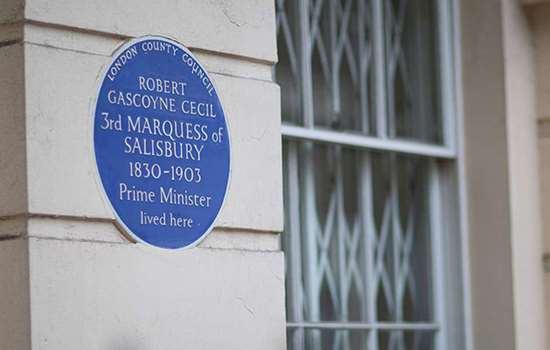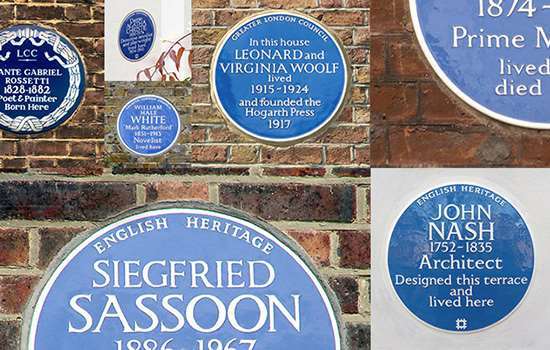BEVAN, Aneurin 'Nye' (1897–1960) and LEE, Jennie (1904–1988)
Plaque erected in 2015 by English Heritage at 23 Cliveden Place, Chelsea, London, SW1W 8HD, Royal Borough of Kensington and Chelsea
All images © English Heritage
Profession
Politician, Politician
Category
Politics and Administration
Inscription
ANEURIN 'NYE' BEVAN 1897–1960 and JENNIE LEE 1904–1988 Politicians lived here 1944–1954
Material
Ceramic
The husband and wife team of Aneurin Bevan and Jennie Lee, who respectively had founding roles in the National Health Service and the Open University, share a blue plaque on their former home near Sloane Square. They were living in this property when the National Health Service came into being in July 1948.
From the mine to Westminster
One of the leading figures of the post-war Labour government led by Clement Attlee, Aneurin – known as Nye – Bevan knew the meaning of hardship. Born in November 1897 in Tredegar, South Wales, he left school to work down the mine at 14. And he was lucky: four of his nine siblings did not survive childhood.
Elected Labour MP for Ebbw Vale – his local seat – in 1929, he was soon identified as a major talent. A fine orator – combative and controversial – he was one of the few MPs during the Second World War with the temerity to criticise Winston Churchill, who called him ‘a squalid nuisance’.
In 1945 – having had no ministerial experience – Bevan became Minister of Health and Housing in Attlee’s new Labour Government. Under his stewardship, over one million good quality homes were built, despite Britain’s war-shattered economy.
The NHS
Bevan’s crowning achievement was the founding of the National Health Service (NHS). To create a comprehensive service free at the point of use, hospitals were taken into public ownership, and the sale and purchase of GPs’ practices stopped. The National Health Service Act became law on 6 November 1946, and was fully instituted on 5 July 1948.
Bevan had to take on many vested interests to create the NHS. His response to defenders of the existing piecemeal but more homely health provision was characteristically crisp: ‘I would rather be kept alive in the efficient if cold altruism of a large hospital than expire in a gush of warm sympathy in a small one.’
Bevan resigned from the government in 1951 over the introduction of charges for some health services. He became a standard bearer for the Left, and contested the Labour leadership with Hugh Gaitskell in 1955, before going on to serve as shadow foreign secretary. At the young age of 62, he died from cancer in July 1960.
Jennie Lee and the Open University
Jennie Lee was born in 1904 at Lochgelly in Fife, Scotland and like Bevan, came from a mining background. She abandoned a career in teaching for politics and in 1929, at the age of 24, she was elected MP for North Lanarkshire, becoming (at that time) the youngest woman ever elected to Parliament. She soon became known for her charisma and – again, like her future husband – sharp speaking skills.
Lee lost her seat in the 1931 general election but later won Cannock – a West Midlands mining constituency – for the Labour Party in 1945, and held the seat until 1970.
In 1964 Lee was given ministerial responsibility for the arts by the Prime Minister Harold Wilson. She brought to her brief a strong belief that the arts should be for everyone, and should be funded adequately. Enhanced facilities on London’s South Bank opened during her time in office.
Her biggest success – and in Wilson’s view, the biggest of his administration’s – was the foundation of the Open University. This enterprise, to bring higher education to many who had otherwise missed out, admitted its first students in 1971. By the 1980s, enrolment figures had reached 100,000.
Lee entered the House of Lords in 1970, taking the title of Baroness Asheridge, which referenced the Buckinghamshire farm she shared with Bevan in their later years. She died at her home in Chester Row, Chelsea, in 1988.
Nye and Jennie at Cliveden Place
Bevan and Lee were married in 1934 and moved to 23 Cliveden Place in 1944. At first they lived in the basement, while the bomb-damaged upper storeys were renovated. The 19th-century townhouse was their London home for a decade.
They furnished the place with taste and care, and an eye for a bargain antique. Bevan and Lee were convivial hosts. ‘Everything was laughter and fun and larger than life’, recalled the actress Constance Cummings, who was part of their circle. ‘I remember so often being at their home and hearing Nye in the kitchen with Jennie’s mother arguing over the way to cook something.’
Read more about Aneurin Bevan and Jennie Lee at the Oxford Dictionary of National Biography.


